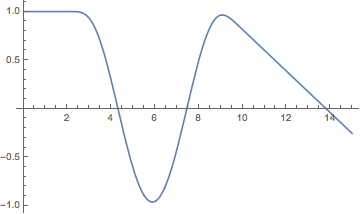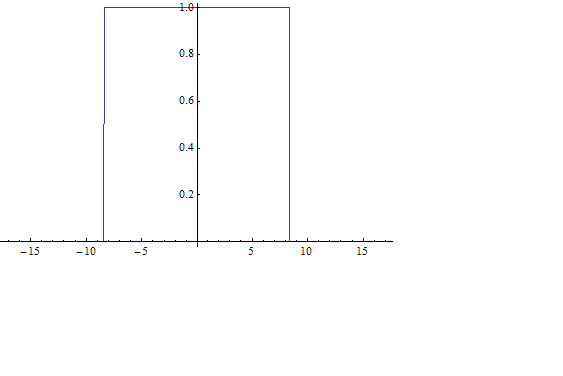For NDSolve, an InterpolatingFunction might be sufficient. Here are smooth versions of UnitStep and UnitBox, with a smoothing "radius" of epsilon.
us[epsilon_] :=
Interpolation[{{{-epsilon}, 0, 0}, {{epsilon}, 1, 0}},
"ExtrapolationHandler" -> {If[# < -epsilon, 0, 1] &, "WarningMessage" -> False}];
ub[epsilon_] :=
Interpolation[
{{{-1/2 - epsilon}, 0, 0}, {{-1/2 + epsilon}, 1, 0},
{{1/2 - epsilon}, 1, 0}, {{1/2 + epsilon}, 0, 0}},
"ExtrapolationHandler" -> {0 &, "WarningMessage" -> False}]
Example
sol = NDSolve[{y''[x] + ub[0.1][(x - 6)/6.5] y[x] == 0, y[0] == 1, y'[0] == 0}, y, {x, 0, 15}];
Plot[y[x] /. First[sol], {x, 0, 15}]

Response to updated question
You could construct an explicit interpolation for your particular use case instead of using the generic functions us and ub. For example, for the updated question, one could replace the ± 1/2 by ± 8.5 in ub, or by arbitrary cutoffs a, b, if a general function is needed, as follows.
smoothbox[a_, b_, epsilon_] /; a < b && epsilon > 0 := Interpolation[{
{{a - epsilon}, 0, 0}, {{a + epsilon}, 1, 0},
{{b - epsilon}, 1, 0}, {{b + epsilon}, 0, 0}},
"ExtrapolationHandler" -> {0 &, "WarningMessage" -> False}]
GraphicsRow@{
Plot[smoothbox[-8.5, 8.5, 2.5][x], {x, -15, 15}],
Plot[smoothbox[-8.5, 8.5, 2.5][x], {x, 5, 12}]}





Tanh? I think the proper parametrization (how steep you make them) needs some information about your problem... $\endgroup$x = -8.5andx = 8.3? $\endgroup$